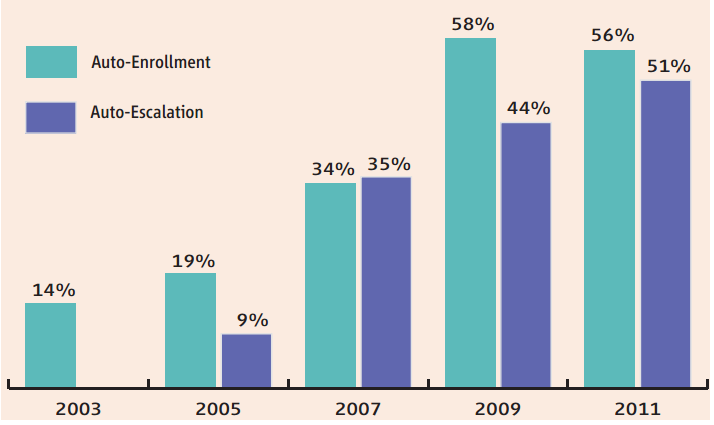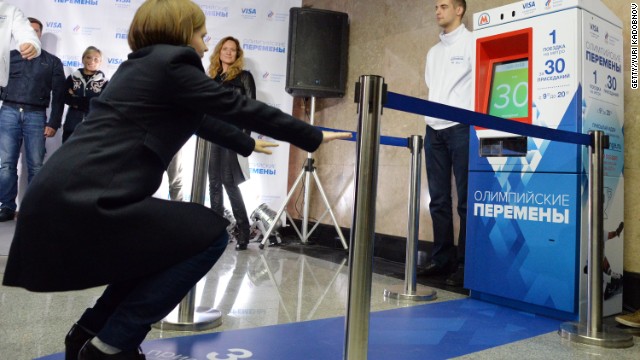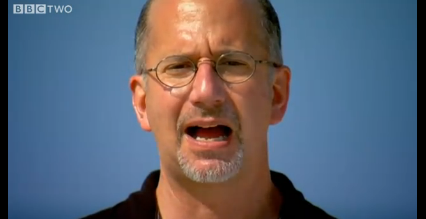In the United States, the FDA tried to mandate that cigarette companies put nasty images of the harms of smoking onto cigarette packages, images that would take up at least half of the carton. It looks like that effort has failed, because the courts have determined that it violates the First Amendment. I wonder what the courts will think about this graphic image, which somebody painted onto the ceiling of a “smoker’s room”.

That’s got to give people reason for pause.
A Clever Way to Promote Recycling
Behavioral science has taught me that subtle environmental cues can have a surprisingly strong influence on people. I don’t know if the following cue was purposeful or not, but the relative size of these two receptacles – the blue one being the recycling one of course – definitely sends a strong signal about how much of the stuff we throw away ought to be recycled instead. Do you think that will influence behavior?

The Growing Importance of Behavioral Economics in Retirement Saving Plans
Dick Thaler, an economist who helped create the field of behavioral economics, came up with a wonderful idea a long time ago to promote retirement savings, a plan he calls Save More Tomorrow. Among the many clever aspects of his plan is the idea of automatic escalation of people’s retirement contributions. Think of the idea this way. I might hope to put, say, 5% of my savings aside for retirement each year. But I’m not saving anything right now. So to go from 0 to 5% in one year would be difficult, and I would feel like I lost a lot of my take-home pay. Thaler’s idea is for me to commit to growing my retirement savings rate, by deciding right now to let it increase in the ensuing years, automatically. In other words, if I don’t do anything else again, my retirement savings will go up.
Another part of his idea is to get people automatically enrolled in retirement saving plans, while leaving them the option of opting out. In traditional retirement plans, people have to decide whether to maximize their retirement savings, and if they put off the decision, they end up not contributing anything to retirement. Save More Tomorrow flips this situation. It asks people to decide whether they don’t want to save for retirement, and if they put off the decision, they end up contributing maximally to the retirement plan.
As the graph below shows, which I got from this wonderful website at the University of Stirling, this plan is really catching on:

Amazing what a little bit of psychology can do to improve people’s economic behavior.
(Click here to view comments)
Squat for Your Subway Token: One of the Most Creative Nudges I've Encountered
This idea is so crazy it might just be the best one I’ve heard all week: a subway station in Moscow provides free tickets to commuters who stand in front of a monitor and squat or lunge 30 times.

I love this idea. Have any of you heard of any other nudges like this?
(Click here to view comments)
Why James Bond Needs to Wear Condoms
 Think of the last few times you watched a popular movie that involved any kind of sex scene? Not as in pornographic sex, but as in two characters ended up in bed together and had, ahem, conjugal relations.
Think of the last few times you watched a popular movie that involved any kind of sex scene? Not as in pornographic sex, but as in two characters ended up in bed together and had, ahem, conjugal relations.
In how many of those scenes did either participant make mention of a condom before the act?
We face a public health crisis of sexually transmitted diseases and unwanted pregnancies, in large part because so few people use condoms. According to CDC estimates, Americans experienced 20 million new sexually transmitted infections in 2012, with half of those striking America’s youth. The majority of these infections could have been prevented by condoms.
There are lots of reasons people do not make enough use of these life-saving prophylactics. Unplanned sex happens, where neither partner is prepared. More often, neither party wants to spoil the moment… (Read more and view comments at Forbes)
Would Tactics like the New York Soda Ban Work?
 Although blocked for now, New York Mayor Michael Bloomberg’s Soda Ban has many wondering what tactics could actually help consumers kick certain bad habits? Threats? Pricing? Bans? Graphic images? What actually works and what role should the government play? I recently had the pleasure of participating in a discussion addressing all these questions. Listen to the discussion here to get a sense of the varied views, opinions, and concerns surrounding the issue!
Although blocked for now, New York Mayor Michael Bloomberg’s Soda Ban has many wondering what tactics could actually help consumers kick certain bad habits? Threats? Pricing? Bans? Graphic images? What actually works and what role should the government play? I recently had the pleasure of participating in a discussion addressing all these questions. Listen to the discussion here to get a sense of the varied views, opinions, and concerns surrounding the issue!
Brain Control and Consumer Behavior
 I teach a course on consumer irrationality and market failure at the Fuqua School of Business. I open up one of my lectures with a brief video demonstration of what psychologists call “the McGurk effect.” (See an example here.) In the video, a man makes the sound “ba ba ba.” About half of my students invariably identify the sound accurately. But the other half? They swear on their mothers’ graves that he said “fa fa fa.”
I teach a course on consumer irrationality and market failure at the Fuqua School of Business. I open up one of my lectures with a brief video demonstration of what psychologists call “the McGurk effect.” (See an example here.) In the video, a man makes the sound “ba ba ba.” About half of my students invariably identify the sound accurately. But the other half? They swear on their mothers’ graves that he said “fa fa fa.”
Why such strong disagreement? Because that latter half of my class listened to the videos with their eyes wide open, and their eyes told their ears what to hear. You see, the people who made the video spliced in the sound of the man saying “ba, ba, ba” over a video of him saying “fa fa fa.” Confronted with this inconsistent sensory evidence, these students’ brains tried to come up with a coherent picture of the world. As a result, they mistakenly believed the man was saying something he wasn’t saying… (Read more and view comments at Forbes)
Lifesaving Lessons from the Makers of Sprite?
![]() It was the late 90s and HIV was spreading through South African teenagers like, well, like a sexually transmitted disease. Sleep with a South African at that time and you faced a one in six chance of having a close encounter with the virus. Frightening odds. But not frightening enough to curb teenage sexual activities.
It was the late 90s and HIV was spreading through South African teenagers like, well, like a sexually transmitted disease. Sleep with a South African at that time and you faced a one in six chance of having a close encounter with the virus. Frightening odds. But not frightening enough to curb teenage sexual activities.
Desperate to turn the tide, public health leaders came up with a new anti-HIV campaign: NASHI, for the National Adolescent Sexual Health Initiative. Personally, I think they should have called it ESTINA for Every South African Teenager is Now Asleep. Because that campaign, like so many public health campaigns, was doomed to fail. It was all information, and no persuasion. All lecture, no fun… (Read more and view comments at Forbes)
New York's Soda Prohibition Won't Work
 New York City’s plan to prohibit the sale of large, sugary soft drinks is a brave and provocative policy, one that promotes public health at minimal cost to New York City residents.
New York City’s plan to prohibit the sale of large, sugary soft drinks is a brave and provocative policy, one that promotes public health at minimal cost to New York City residents.
Mayor Michael Bloomberg’s announcement last week highlights the kind of tough regulatory action we, as a society, need to make to combat an obesity epidemic that experts say will cause this generation of elementary school children to be the first in centuries to experience a shorter life span than their parents…(Read the rest here)
